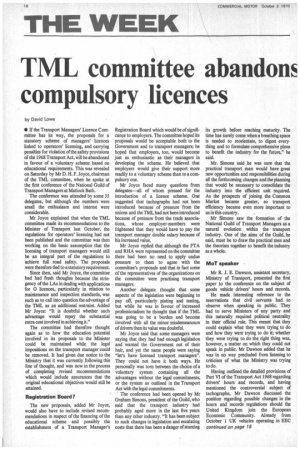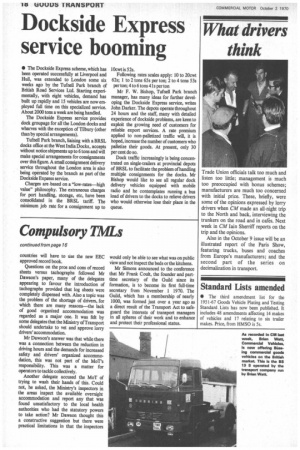TML committee abandons compulsory licences
Page 18

Page 20

If you've noticed an error in this article please click here to report it so we can fix it.
by David Lowe • If the Transport Managers' Licence Committee has its way, the proposals for a statutory scheme of managers' licences linked to operators' licensing, and carrying penalties for violation of the safety provisions of the 1968 Transport Act, will be abandoned in favour of a voluntary scheme based on educational requirements. This was revealed on Saturday by Mr D. H. F. Joyce, chairman of the TML committee, when he spoke at the first conference of the National Guild of Transport Managers at Matlock Bath.
The conference was attended by some 35 delegates, but although the numbers were small the enthusiasm and interest were considerable.
Mr Joyce explained that when the TML committee made its recommendations to the Minister of Transport last October, the regulations for operators' licensing had not been published and the committee was then working on the basic assumption that the licensing of transport managers would still be an integral part of the regulations to achieve full road safety. The proposals were therefore tied to a statutory requirement.
Since then, said Mr Joyce, the committee had had fresh thoughts because the stringency of the LAs in dealing with applications for 0 licences, particularly in relation to maintenance and inspection standards, was such as to call into question the advantage of the TML as an additional restraint. Added Mr Joyce: "It is doubtful whether such advantage would repay the substantial extra cost involved in achieving it."
The committee had therefore thought again as to how the education potential involved in its proposals to the Minister could be maintained while the legal impositions on the transport manager could be removed. It had given due notice to the Ministry that it was currently following this line of thought, and was now in the process of completing revised recommendations which would include assurances that the original educational objectives would still be attained.
Registration Board?
The new proposals, added Mr Joyce, would also have to include revised recommendations in respect of the financing of the educational scheme and possibly the establishment of a Transport Manager's Registration Board which would be of significance to employers. The committee hoped its proposals would be acceptable both to the Government and to transport managers; he hoped that employers, too, would become just as enthusiastic as their managers in developing the scheme. He believed that employers would give their support more readily to a voluntary scheme than to a compulsory one.
Mr Joyce faced many questions from delegates—all of whom pressed for the introduction of a licence scheme. One suggested that tachographs had not been introduced because of pressure from the unions and the TML had not been introduced because of pressure from the trade associations, whose employer-members were frightened that they would have to pay the transport manager double salary because of his increased value.
Mr Joyce replied that although the FTA and RHA were represented on the committee there had been no need to apply undue pressure to them to agree with the committee's proposals and that in fact some of the representatives of the organizations on the committee were practising transport managers.
Another delegate thought that some aspects of the legislation were beginning to pay off, particularly plating and testing, but while he was in favour of increased professionalism he thought that if the TML was going to he a burden and become involved with all the minor misdemeanours of drivers then its value was doubtful.
Mr Joyce said that some managers were saying that they had had enough legislation and wanted the Government out of their hair, and yet the same people were saying "let's have licensed transport managers". They could not have it both ways. He personally was torn between the choice of a voluntary system containing all the advantages without the legal commitments, or the system as outlined in the Transport Act with the legal commitments.
The conference had been opened by Mr Graham Simons, president of the Guild, who said that the transport industry had probably aged more in the last five years than any other industry. "It has been subject to such changes in legislation and escalating costs that there has been a danger of stunting its growth before reaching maturity. The time has surely come when a breathing space is needed to reorientate, to digest everything and to formulate comprehensive plans to benefit the industry for the future," he said.
Mr. Simons said he was sure that the practical transport man would have great new opportunities and responsibilities during all the forthcoming changes and the planning that would be necessary to consolidate the industry into the efficient unit required. As the prospects of joining the Common Market became greater, so transport efficiency became even more important to us in this country.
Mr Simons saw the formation of the National Guild of Transport Managers as a natural evolution within the transport industry. One of the aims of the Guild, he said, must be to draw the practical men and the theorists together to benefit the industry as a whole.
MoT speaker Mr R. J. E. Dawson, assistant secretary, Ministry of Transport, presented the first paper to the conference on the subject of goods vehicle drivers' hours and records.
He made interesting reference to the reservations that civil servants had to observe when speaking in public. They had to serve Ministers of any party and this naturally required political neutrality in their official role. This meant that they could explain what they were trying to do and how they were trying to do it; whether they were trying to do the right thing was, however, a matter on which they could not speak in public. Mr Dawson added that he was in no way precluded from listening to criticism of what the Ministry was trying to do.
Having outlined the detailed provisions of Part VI of the Transport Act 1968 regarding drivers' hours and records, and having mentioned the controversial subject of tachographs, Mr Dawson discussed the position regarding possible changes in the hours and records regulations should the United Kingdom join the European Economic Community. Already from October 1 UK vehicles operating in EEC continued on page 18 countries will have to Use the new EEC approved record book.
Questions on the pros and cons of record sheets versus tachographs followed Mr Dawson's paper, many of the delegates appearing to favour the introduction of tachographs provided that log sheets were completely dispensed with. Also a topic was the problem of the shortage of drivers, for which there are many reasons—the lack of good organized accommodation was regarded as a major one. It was felt by some delegates that the Ministry of Transport should undertake to vet and approve lorry drivers' accommodation.
Mr Dawson's answer was that while there was a connection between the reduction in driving hours and the demands for increased safety and drivers' organized accommodation, this was not part of the MoT's responsibility. This was a matter for operators to tackle collectively.
Another delegate accused the MoT of trying to wash their hands of this. Could not, he asked, the Ministry's inspectors in the areas inspect the available overnight accommodation and report any that was found unsatisfactory to the local health authorities who had the statutory powers to take action? Mr Dawson thought this a constructive suggestion but there were practical limitations in that the inspectors would only be able to see what was on public view and not inspect the beds or the kitchens.
Mr Simons announced to the conference that Mr Frank Coult, the founder and parttime secretary of the Guild since its formation, is to become its first full-time secretary from November 1 1970. The Guild, which has a membership of nearly 1000, was formed just over a year ago as a direct result of the Transport Act to safeguard the interests of transport managers in all spheres of their work and to enhance and protect their professional status.












































































































